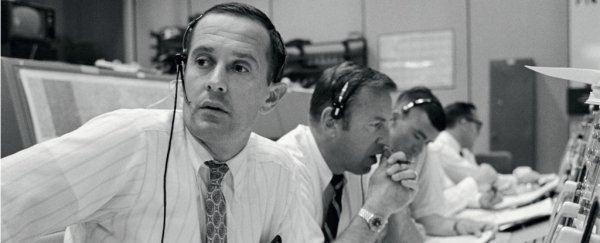It was July 1969 when Neil Armstrong's boot first landed on the rocky surface of the Moon.
"One small step for man," Armstrong declared. "One giant leap for mankind".
The crackling message, which journeyed from the lunar surface all the way back to ground control in Houston, is one of the most famous and well-travelled quotes of all time.
It's also just the tip of the iceberg.
NASA and the University of Texas, Dallas have now released 19,000 hours of additional recordings between ground control and the astronauts on board the historic Apollo 11 mission.
While nothing can quite beat Armstrong's powerful turn of phrase, the massive audio archive offers listeners a chance to travel through both space and time.
The hours and hours of audio encompasses every single communication between the astronauts, mission control and back-room support staff during the entire mission.
Sifting through the clips, the story that emerges is less about the astronauts on board and more about the heroes behind the heroes - the teamwork, collaboration and camaraderie that brought three astronauts there and back again.
"The real story is the mission control side of things," Ben Feist, a software engineer who is helping to organize and process the audio, told NBC.
"How did they do it? How did they send everybody to the moon?"
The achievement was not easy, and success was never assured. The main Apollo control room, based at the Johnson Space Center in Houston, had only 20 computer consoles, and these were computers that are much less powerful than the smart phones we use today.
While NASA's then new communication system had worked on simpler missions, the Apollo 11 mission was going further than ever before. The fact that mission control was able to communicate with the astronauts at all was a huge achievement.
Although, as with most new technology, there were a few hiccups.
Just before the craft was scheduled to land on the Moon, mission control began to struggle with spotty radar data and communication. If it got any worse, the mission would have to be aborted.
Then, the master alarm sounded in the cabin. A tense moment of exchanges followed.
"Program alarm," warns Armstrong in the newly available audio. "It's a 1202".
"1202," Buzz Aldrin confirms.
"1202? What's that?" asks an unknown voice at mission control.
"It's executive overflow," another answers, confirming that the computers were overwhelmed by tasks.
"If it does not occur again, we're fine".
With every second of crackling silence, the space craft was getting closer and closer to the Moon, and the astronauts were left waiting for the all-clear – the alleviating message that everything will be fine.
None of those on board had ever experienced this error before.
"Give us a reading on the 1202 program alarm," Armstrong says.
Finally, the reply comes: "Roger, we got you, we're go on that alarm".
Not every moment recorded on these tapes is quite so dramatic. For instance, there's audio of mission control reading out the news from Earth, including an update about an oatmeal-eating competition.
"I'd like to enter Aldrin in the oatmeal-eating contest," says astronaut Michael Collins, the third member of the crew, who remained in orbit around the Moon while Aldrin and Armstrong landed on the satellite.
"He's on his 19th bowl".
One light-hearted segment from the Apollo mission's return to Earth reveals just how close the astronauts had become to the inanimate technology on board.
"That old service module's taken good care of us. We want to take good care of it," says Collins.
"It sure has, hasn't it?" replies mission control.
"It's been a champ," says Collins.
And as the mission began to near its end, things began to lighten up even more. Another clip features mission control joking about the drunk celebrations that would no doubt follow the astronaut's return to Earth.
"You throw a match in that Clear Lake area, and it'll explode," says an unknown voice.
The intimate and enlightening nature of these archives could not be experienced without the hard work of researchers at the University of Texas. They were the first to dust off more than 200 analog tapes that had been stored away by NASA for decades.
By the time these researchers got their hands on the audio, these tapes were so old-fashioned that they could only be played on a SoundScriber – an ancient piece of equipment used in the 1960s and that is still located at the NASA Johnson Space Center in Houston.
But this technology was notoriously sluggish, and if the researchers had done it all by hand, it would have taken at least 170 years to digitise all the audio.
"We couldn't use that system, so we had to design a new one," Hansen said, according to the UT Dallas blog.
"We designed our own 30-track read head, and built a parallel solution to capture all 30 tracks at one time. This is the only solution that exists on Earth."
The audio can now be listened to on NASA's archival page or UT Dallas' website.
